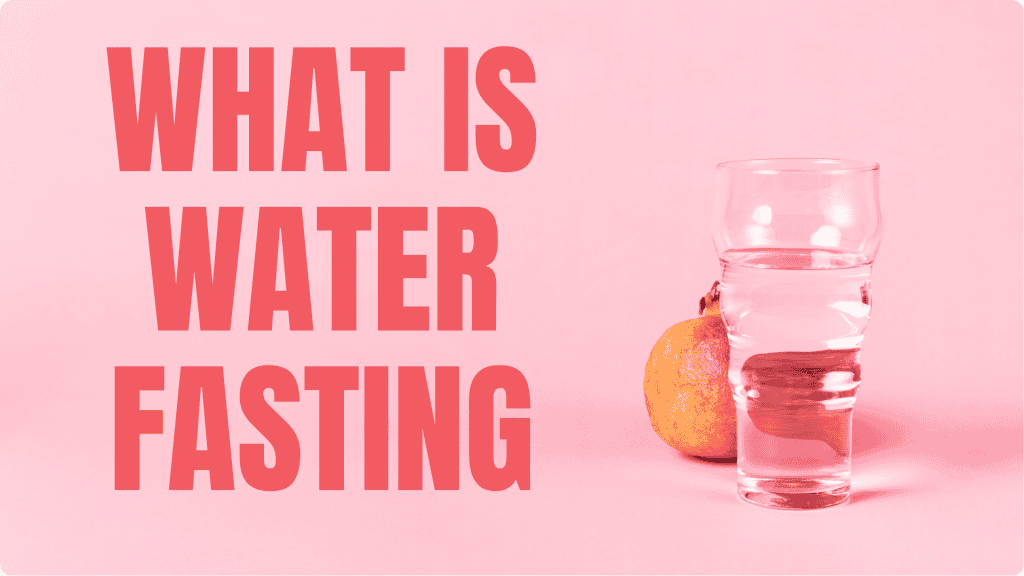Water fasting is where you only take water for several days, 24 to 72 hours, and nothing else is permitted. This has been done for centuries, usually with a religious or spiritual intent. Still, people do water fast for reasons like weight loss detoxification, among many other reasons, just to renew their eating habits. Most importantly, one should note that fasting for more than 72 hours without proper advice from a medical professional can harm one’s health. This means that even though a short fast can benefit one in terms of improved metabolism, loss of fat, or more mental clarity, it bears some risks, especially for those with underlying medical conditions.
Therefore, talking to a healthcare professional before attempting longer fasts is crucial to avoid complications like dehydration or nutrient deficiencies. For those curious about its effectiveness, we need to examine what is water diet and why it has gained popularity.
How Does Water Fasting Work?
Water fasting causes your body to run off its stored energy and not necessarily off of food, so when you stop eating, your body will use the glycogen stored in your liver and muscles to sustain energy. Here is one simple explanation for the people asking what is water fasting and how it works. Once the glycogen has been expended, typically after 24-48 hours, the body starts relying on ketosis by breaking down fat reserves for sustenance. As we compare various nutrition plans, it’s vital to ask what is water diet and its relevance today. Thus, this process can even lead to weight loss as your body uses stored fats as energy.
Furthermore, water fasting affects hormones; for example, water fasting lowers insulin levels and might enhance insulin sensitivity. Human growth hormone (HGH) increases, which can help preserve muscle mass during fasting. Also, fasting could trigger autophagy, an action in which your cells break up the damaged parts, possibly detoxifying and reducing inflammation. Medical care should be sought for safety reasons if you are too fast for more than 72 hours due to health risks. To better understand its health benefits, let’s explore what is water fasting and how you water fast. Therefore, to explore what should I drink to lose weight, you might want to consider the benefits of various juices for weight loss.
How Do You Water Fast?
To start our exploration of effective diets, we need to consider what is water diet and its key components. You will need to condition your body if you attempt water fasting-you would have to remove the heavy and processed foods a day or two before starting. You can have lighter meals such as fruits and vegetables or soup to ease your body into it with fewer hassles. Hydration during the fast should be done only through water. Drink at least 2-3 liters of water throughout the day. Typically, what is water fasting? It’s a fasting regime that lasts up to 24 to 72 hours, but it is safe beyond this term and with a doctor’s recommendation. But it is also important to listen to your body.
If you feel dizzy or weak or are in discomfort, it might be smart to break your fast early by consuming a very light, small meal. For anyone considering a new dietary approach, knowing what is water dieting is fundamental to evaluating its benefits. Again, when breaking the fast, ease back into eating slowly with easily digestible fruits and vegetables foods. Moreover, avoid eating heavy or processed meals for a few days to avoid digestive discomfort. Lastly, after completing the fast, hydrate well and replenish electrolytes and nutrients by taking nutrient-dense foods. Light physical activity such as walking can help increase the resting metabolism after the fast. Before diving into the pros and cons, it’s essential to clarify what is water diet is and its basic principles.
1. Water Fast (24–72 hours)
Within 24 to 72 hours into a water fast, some mighty important changes occur in your body. In the first 24 hours, it burns off the stored glycogen energy from carbohydrate intake. When it depletes those, usually after a day, it starts burning fat for energy. This is called ketosis, which usually comes on around the 48-hour mark, on average. This metabolic shift also supports fat burning and improves insulin sensitivity, which works to control blood sugar levels. In addition, during this stage, your body may initiate autophagy- the natural removal of dead cells that detoxifies the body. Usually, water fasting for this duration is considered safe, but going beyond the 72-hour mark without proper monitoring will cause complications such as nutrient deficiencies and extreme weakness.
If you are still asking yourself what should I drink to lose weight, turning to healthy morning drinks for weight loss could transform your mornings.
2. Post-Fast (1–3 days)
Pay much attention to reinitiating eating after you complete the water fast, which requires you first to eat small portions of digestible foods such as fruits and vegetables or some broth. For this reason, your digestive system needs time to adjust. Jumping on heavily processed foods, even fried food, might make you uncomfortable or cause digestion problems. You still don’t want to suffer from refeeding syndrome- your body is only getting flooded with too much nutrition too fast. Make sure you hydrate and gradually increase the variety and quantity of food so that your body can absorb everything harmoniously.
In considering effective weight loss strategies, let’s first clarify what is water diet and its underlying principles.
Benefits of Water Fasting
Amazingly, water fasting has gained wide popularity for weight loss and, more importantly, for improving health aside from fat loss. Besides lowering your calorie intake, it can help improve your overall well-being by boosting your metabolic levels, increasing your insulin sensitivity, and reinforcing natural detoxification. In simple terms, what is water dieting or fasting? When one fasts on a water-only diet, one gives one’s body a break from all that continuous digestion and focuses more on healing and rejuvenation. Let’s talk more about what is water fasting and the benefits of water fasting now.
- Boosts Metabolism
- Improves Insulin Sensitivity
- Detoxifies the Body
- Supports Autophagy
- Reduces Inflammation
- Improves Mental Clarity
1. Boosts Metabolism
It is the way your body can convert food into energy very efficiently. A water fast will kick in, burning the fats for energy, especially after 24-48 hours when it has released the stored sugars within it and, therefore, burns more calories than before. On the other hand, ketosis has also been associated with enhanced fat loss since, without food to burn, your body relies on fat stores as a fuel source. Consequently, water fasting not only aids weight loss but also improves how the body uses energy even after the fast.
2. Improves Insulin Sensitivity
It also directly influences insulin sensitivity. Insulin is an essential hormone in the body that controls blood sugar levels; if there is an improvement in insulin sensitivity, your body responds more effectively to insulin so that your blood sugar level stabilizes. With water fasting, it results in lowering the level of insulin and increasing cellular sensitivity to insulin. For instance, it would greatly reduce the risk of developing type 2 diabetes due to the increased sensitivity to insulin, meaning controlling blood sugar levels better. Moreover, it implies reduced fat deposition due to lower insulin levels, which always serves to stay fit in the long term.
3. Detoxifies the Body
Your body has intrinsic detoxification powers. Water fasting supports the course of autophagy. Autophagy is how your body purifies and replaces damaged cells with newer, healthier cells. Fasting allows your body to concentrate on cellular repair rather than digesting food. Moreover, autophagy cleans out toxins; this decreases chronic diseases such as cancer. For example, it has been found to remove toxins in the body and to prevent the arising of diseased states resulting from damaged cells.
4. Supports Autophagy
It is now an important process of cellular renewal, which also keeps you healthy at the cellular level. Starting on a water fast, autophagy begins when your cells can break up and get rid of things that are broken or not needed within the cell, thereby participating in cellular regeneration, which keeps the chances of disease away from something such as cancer or heart condition. This process also enhances the healing capability of the body. It does this by maintaining cleanliness and health, meaning water fasting helps at a deeper level. As you search for what should I drink to lose weight, don’t overlook the benefits of drinking hot water, which can soothingly support your goals.
5. Reduces Inflammation
Several diseases related to chronic inflammation include heart disease, arthritis, and even cancer. Water fasting has also managed to decrease the inflammatory marker levels to assist the body in reducing extreme inflammatory responses. This is partly because when one is on a fast, his body utilizes fats as energy, producing fewer inflammation by-products than when breaking down carbohydrates. Therefore, water fasting can be one of the tools aimed at reducing inflammation and preventing the onset of diseases related to chronic inflammation.
6. Improves Mental Clarity
Many people who go for water fasting will experience some kind of cognitive enhancement. This is because the body will fall into a state called ketosis, in which your body will burn fat for energy, thus providing the brain with a continuous fuel supply. Additionally, the stabilization of the blood sugar level does not cause spikes in energy that result in mental fogginess associated with most carbs. Another study shows that fasting can raise the levels of a protein called brain-derived neurotrophic factor, BDNF, which has supportive functions for the brain’s health and mental clarity.
To enhance our discussion on fasting techniques, we should first understand what is water dieting is and its applications.
How Does Drinking Water Make You Burn Calories?
For example, drinking cold water may cause you to burn calories through water-induced thermogenesis. Loosely put, if you take in cold water, your body will spend its energy to warm it up to your body’s basic temperature and thus create energy by burning calories. For instance, many people wonder what is water diet is, as it promises quick results with minimal effort. Experiments show that after taking nearly 500ml of cold water, your metabolic rate could be increased by as much as 24-30% for an hour. However, although drinking water alone is unlikely to result in dramatic weight loss, it can support metabolic processes inside your body and enhance fat burning when supported with healthy eating or fasting strategies. When considering what I should drink to lose weight, exploring effective weight loss drinks that can help boost your metabolism is essential.
Hydration also allows you to keep up an incredibly efficient metabolism. Hydration right before meals can be an effective appetite suppressor and prevent overeating in some situations. Proper hydration is fundamental for better maintenance of a healthier lipid status; it improves your rate of burning fat by stimulating the body’s processes of lipolysis, that is, burning whatever has been stored in your body as fat. So, though the caloric burn directly attributed to water consumption may be relatively minimal, increased metabolism levels, lower hunger, and greater burning of fats are a basic component of any weight loss or body fat management program. Before diving into the pros and cons, it’s essential to clarify what is water dieting is and its basic principles.
Dangers and Risks of Water Fasting
Among so many diets and fasts, water fasting is one where a person abstains from food intake, only drinking water. Many people opt for it because it helps reduce weight and detoxify the body. As good as these might be, several risks crop up, including serious ones, depending on the period and due to lack of guidance when attempting to embark on such. So, what is water diet, and why is it gaining traction among health enthusiasts? Let’s talk about some of the dangers you should know about:
1. Nutrient Deficiency
A nutrient deficiency is when the body does not receive adequate vitamins and minerals, which it needs to be at its best. In water fast, of course, you are cutting off all food sources and thus cutting out such vital nutrients as potassium, magnesium, and sodium- all of which play significant roles in your heart, muscles, and nerves. For instance, potassium helps your heart maintain its beat regularly, while magnesium is required for proper muscle functions. Without these, the body can start to suffer from issues such as muscle weakness or irregular heartbeats. In addition, studies have indicated that even fasts of a day or less can reduce these critical nutrients. In other words, it only takes a short time before your body begins to feel the nutrient losses. Thus, the risk of nutrient deficiency needs to be considered when beginning a water fast.
2. Dizziness and Fatigue
Because your body is not really getting any calories to use for energy, it is one of the main reasons people often get dizzy or feel weak and lightheaded when they try water fasting. Normally, what you eat would supply the fuel your body needs to go about a day, but when you are not eating, your body has to metabolize the fats stored within your body for these tasks, which do not supply energy at the same speed. But when you miss a meal, for instance, weakness or tiredness must have been felt. Imagine skipping meals for days—your body starts running on empty. Further, as your glycogen stores, that is, your quick energy source, you will be far more weary and less able to concentrate. Therefore, it is not unusual to feel low energy and dizziness in water fasting, and even simple things become difficult to handle.
3. Lowered Blood Sugar Levels
Your blood sugar affects your energy or shakiness throughout the day. It will drop when you fast, especially when you do not eat. That is, your body misses the regular supply of glucose from carbohydrates in food. For instance, a lack of sufficient glucose may make your body prone to hypoglycemia, a condition characterized by symptoms of shakiness, confusion, or even fainting. For example, vulnerable individuals suffering from diabetes are already dealing with unstable blood sugar levels. A second group is sensitive to low blood sugar; because protracted fasting worsens these symptoms, such people should exercise care. Finally, some studies demonstrate that water fasting triggers disruptions in blood sugar levels even for people without a predisposing condition.
4. Electrolyte Imbalance
Electrolytes like sodium, potassium, and calcium maintain muscle and nerve order and during a long fasting period, electrolytes may easily become out of balance since you are not taking any foods to restore the balance. This may cause all sorts of complications, such as muscle cramps, heart palpitations, or even more serious issues, like heart failure. For example, when individuals fast for over 48 hours without replenishing electrolytes, they may develop serious side effects since their bodies can no longer properly maintain muscular and heart functions. Also, an imbalance of such electrolytes might occur faster in people suffering from certain medical conditions, thus making water fasting much more hazardous to those individuals. Therefore, a balance of such essential nutrients is necessary considering an extended fast.
Who should not do water fasting?
Some populations are more likely to experience complications if they choose to fast, which could be harmful to them. For instance, people diagnosed with diabetes should never attempt water fasting, as this may cause blood sugar to drop to perilously low levels. More so, patients with heart diseases may experience complications such as electrolyte imbalance, which may cause heart palpitations or worse. In addition, those with a history of an eating disorder should not attempt water fasting because this activates or exacerbates abnormal eating patterns. Pregnant women should also steer clear of fasting because, during pregnancy, their bodies require more nutrients and not less. Moreover, this is at risk with people with weakened immune systems since fasting further compromises their body’s defense system.
For those curious about what should I drink to lose weight, determining the best time to drink green tea for weight loss can make a significant difference.
Expert Review on What is Water Fasting
According to Dr. Monika Chaudhary, a registered nutritionist, water fasting refers to the intake of only water for 24 to 72 hours. This process can help someone who wants to lose weight, get rid of body detoxification, or improve a person’s metabolism. Yet, according to her, water fasting is not healthy for everybody, especially those patients suffering from this kind of disease like diabetes or heart complications. Almost all the weight that will be gained during the water fasting will be due to losing water weight. Hence, it is a short-term solution. Dr Chaudhary advises slowly breaking fast with light foods such as fruits and soups. She advises that stomach problems might be avoided only when undergoing water fasting after proper medical guidance.
References
“The Effects of Prolonged Water-Only Fasting and Refeeding on Markers of Cardiometabolic Risk.” 2022. NCBI. https://www.ncbi.nlm.nih.gov/pmc/articles/PMC8951503/.
Meacham, Jared. 2023. “Water fasting: Benefits, risks, and how to do it.” MedicalNewsToday. https://www.medicalnewstoday.com/articles/319835.
Pilis, Wiesław. 2021. “Is Water-Only Fasting Safe? – PMC.” NCBI. https://www.ncbi.nlm.nih.gov/pmc/articles/PMC8369953/.
FAQs
1. What do you eat on a water diet?
During a water fast, no food is consumed, and only water is allowed. This type of fast completely restricts caloric intake, and individuals typically consume about 2 to 3 liters of water daily to stay hydrated. It is important to note that a healthcare professional should supervise extended periods of water fasting to avoid potential risks. After the fasting period, it is recommended to break the fast by gradually introducing light, nutrient-rich foods such as fruits, vegetables, and broth to avoid overwhelming the digestive system.
2. Is a water diet good for losing weight?
A water diet or water fast can help with short-term weight loss because it significantly reduces calorie intake. According to research from the University of Illinois Chicago, water fasting can burn fat as the body uses fat stores for energy after glycogen is depleted. However, the long-term sustainability of this weight loss is still being determined, as it can lead to muscle loss, nutrient deficiencies, and a slower metabolism if not properly managed. Combining intermittent fasting or reduced-calorie diets with regular physical activity is advisable for lasting weight loss.
3. What does a 3-day water diet do?
A three-day water fast can provide several health benefits, such as weight loss, reduced blood pressure, and improved insulin sensitivity. After approximately 48 hours, the body enters a state of ketosis, where it starts using fat as the primary energy source. However, there are risks associated with fasting for this time, including dehydration, electrolyte imbalances, and dizziness. It’s essential to monitor your body closely and consult a medical professional, particularly if you have preexisting health conditions.
4. What is a 7-day water fast?
A seven-day water fast is when you drink only water for seven days without eating or drinking other liquids. Some people try this to detox their bodies, lose weight, or for spiritual reasons. During this time, your body uses stored fat for energy. It’s important to talk to a doctor before starting, as going without food for that long can cause dizziness, tiredness, and a lack of important nutrients.









